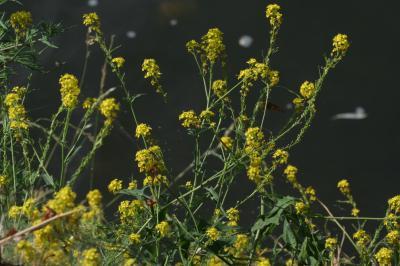A team of Belgian biologists led by researchers at KU Leuven has provided the first genetic evidence that rapid evolution can help non-native plant species spread in new environments. Using samples of centuries-old herbaria and DNA analysis, the researchers reconstructed the genetic adaptations undergone by the Pyrenean rocket prior to its rapid spread in Belgium.
The Pyrenean rocket (Sisymbrium austriacum subsp. chrysanthum) is a plant that grows in the mountains of southern Europe and is particularly prevalent in the Pyrenees. The species was first reported in Belgium – 1,200 kilometres north of its native range – in the first half of the 19th century. Seeds from the plant were most likely introduced alongside the wool industry in and around Verviers. The Pyrenean rocket took root on the banks of the River Vesdre in Verviers and later spread across the Meuse basin towards the Netherlands.
The colonization history of the Pyrenean rocket is well documented, explains postdoctoral researcher and corresponding author Katrien Vandepitte (Plant Conservation and Population Biology Research Group): "We found dried specimens of the Pyrenean rocket in herbaria from the 19th and 20th centuries and were able to isolate DNA from these samples. We then compared this DNA with the genetic profile of contemporary samples from Belgium and the Pyrenees. This gave us a unique opportunity to reconstruct when and how an exotic plant species genetically adapted to a new environment."
"When we looked at the genetic evolution of the Pyrenean rocket, we found the greatest divergences in a set of genes that regulate flowering time, an important plant fitness trait. When we compared current individuals taken from our region and the Pyrenees, both grown under Belgian conditions, the Belgian variant bloomed later."

The Pyrenean rocket (pictured) is a harmless plant, but some exotics can become a real plague even after a period of unproblematic presence in a non-native environment.
(Photo Credit: Katrien Vandepitte)
"Our DNA analysis shows that the Belgian variant genetically adapted quite rapidly – in about 20 generations. This very likely helped the plant to survive and spread here."
"Our findings are important because until now evidence supporting the hypothesis that exotic plants can spread after a period of rapid genetic adaptation has been very scant," says Dr. Vandepitte.
The results also suggest that we should be wary of 'latent' non-native plant species. "These plants can be present in small numbers for years before spreading as a result of genetic adaptation. The Pyrenean rocket is a harmless plant, but some exotics can become a real plague. And this can occur even after a period of unproblematic presence in a non-native environment."






Comments